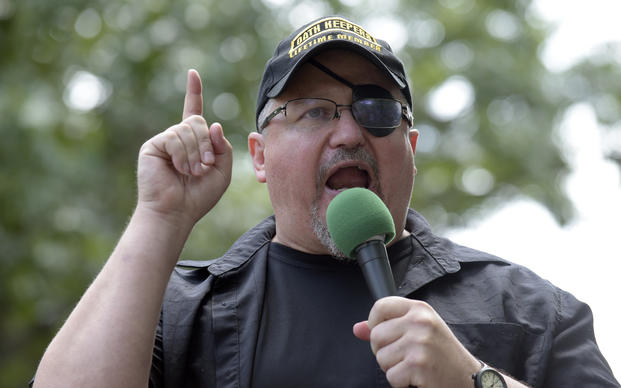Federal prosecutors announced Thursday that 11 members of the Oath Keepers, including the militia group's leader Elmer Rhodes, have been indicted on sedition charges for their actions during the riot that took place at the U.S. Capitol on Jan. 6, 2021.
The new charges allege that Rhodes and company hatched a plan to not only breach the U.S. Capitol but to reinforce their attack with heavily armed "quick reaction forces," or QRFs, that were staged outside Washington, D.C.
Those positioned to back up the initial attack, composed of an unspecified number of Oath Keeper supporters broken into regional groups from Arizona, North Carolina and Florida, were staying in rooms at the Comfort Inn Ballston in Arlington, Virginia, according to court documents. They were never called in to support the attack on the Capitol.
Read Next: Texas Denying Most Guard Troops at Border Chance to Help Families Suffering Hardships at Home
The indictment alleges that the group tried to "oppose the lawful transfer of presidential power by force."
In addition to Rhodes, the Department of Justice press release named 10 others who have been charged: Edward Vallejo, 63; Thomas Caldwell, 67; Joseph Hackett, 51; Kenneth Harrelson, 41; Joshua James, 34; Kelly Meggs, 52; Roberto Minuta, 37; David Moerschel, 44; Brian Ulrich, 44; and Jessica Watkins, 39.
Of the 11 people named in the indictment, five, including Rhodes, are military veterans, according to records kept by the George Washington University Program on Extremism. Caldwell is a Navy veteran and reached the rank of lieutenant commander, while Harrelson, James and Watkins served in the Army. Rhodes is an Army veteran and former paratrooper.
Andrew Mines, a researcher with the Program on Extremism, called the charges "a monumental breakthrough."
"If Rhodes and his Oath Keeper co-conspirators are ultimately convicted on these charges, they will effectively be branded as traitors to this country, and it would be a seismic blow to the Oath Keepers as an organization," he added.
Rhodes and Vallejo are facing charges for the first time, while the others also face earlier charges for their actions on Jan. 6.
According to court documents, the group of Oath Keepers began planning to stop Joe Biden from becoming president before a victor was even called in the 2020 election.
The indictment says that on Nov. 5, 2020, Rhodes told other Oath Keeper leaders that "we aren't getting through this without a civil war." Two days later, when Biden was declared the victor by most news networks, Rhodes shared a video called "Step by Step Procedure, How We Won When Milosevic Stole Our Elections" with the same group.
The indictment outlines how the militia group spent the following weeks training, honing communication strategies, and amassing an arsenal of firearms and ammunition. Rhodes alone spent about $5,000 on guns and related gear on Jan. 1 and 2, 2021; $6,000 on Jan. 3, and $4,500 on Jan. 4, court records allege.
According to the indictment, the weapons were meant for the QRF teams in Virginia that were prepared to ferry them into Washington, D.C., at some point to stop the lawful transfer of presidential power.
On the day of the siege, the 11 people who were indicted broke into two "stacks" -- a military term for a formation of people grouped in a line with their hands on the shoulders of the person in front of them. Both stacks ended up joining the mob, pushing past police officers and breaching the Capitol building. The indictment alleges that once inside, Meggs, Harrelson, Hackett, Moerschel and other members of "Stack One" began searching for Speaker of the House Nancy Pelosi.
Eventually, both groups left the Capitol and met up at a restaurant in Vienna, Virginia, to make more plans. The QRF that was staged in Virginia was never activated.
In the following days, Rhodes continued to stockpile guns, spending more than $15,000 between Jan. 10 and 19, according to the indictment.
The Southern Poverty Law Center calls Rhodes' Oath Keepers "one of the largest far-right antigovernment groups in the U.S. today." The Department of Justice noted that they "explicitly focus on recruiting current and former military, law enforcement, and first-responder personnel."
The arrest of Rhodes and the other Oath Keepers, as well as the fact that at least five of the 11 are veterans, again casts a spotlight on the military's struggle with extremism. According to data from the Program on Extremism, of the more than 700 people facing federal charges over the Capitol siege, at least 81 people, or 12%, have some military experience. The vast majority of those, 73, are veterans.
In the wake of that day, the Pentagon announced steps to investigate the problem. In late December, the Department of Defense announced the first round of policy changes aimed at eliminating extremism in the ranks. The 21-page report created new guidelines for activities that are banned for service members by adding more detail and clarity on what constitutes extremist activity, as well as "active participation."
Much of the activity and rhetoric that groups like the Oath Keepers espouse could now fall under the new policy, which bans a range of things from advocating terrorism or supporting the overthrow of the government to fundraising for an extremist group.
Despite the new policies, the military, and particularly the National Guard, have been slow to crack down on the handful of active-duty service members who were present on Jan. 6.
A National Guardsman who was part of the mob that rampaged through the U.S. Capitol on Jan. 6 is still serving in Wisconsin despite having been sentenced by a federal court to probation and a fine for his actions. Fellow soldiers and his commander wrote letters of support ahead of his sentencing.
-- Konstantin Toropin can be reached at konstantin.toropin@military.com. Follow him on Twitter @ktoropin.
Related: Watchdog to Audit Military's Screening for Extremists at Enlistment











